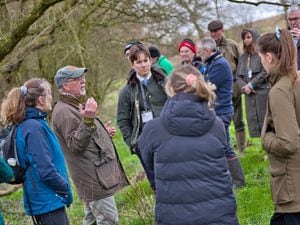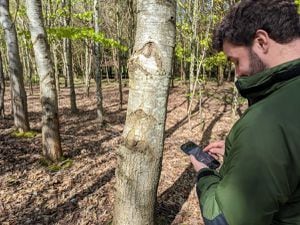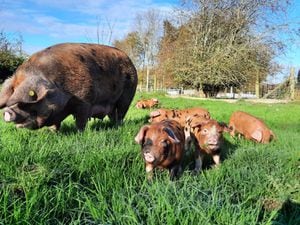Robots on the march in Shropshire farming revolution
Robots in farming have been tipped by experts to become a boom industry – and Shropshire is at the centre the revolution.
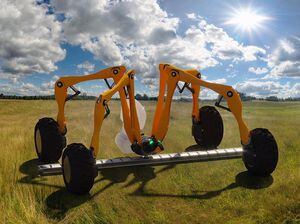
Experts have predicted the use of artificial Intelligence will transform agriculture. And investors are rushing to put their money into a field that is developing fast.
Leaders in Shropshire today said the county has a global reputation as a centre of excellence for technology and that the potential is there for it to become an industry that employs thousands both directly and through the supply chain.
Increasing consumption and rising requirement of better yield of crops are estimated to be one of the major factors that is fuelling the demand of robots in agriculture.
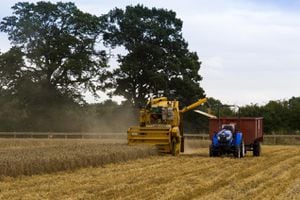
Harper Adams University, near Newport, is one of the leading centres of research into agricultural robots. It has managed to bring in a harvest with driverless machines and has also been developing drone technology.
More farmers are being motivated to scale up farming operations. As they shift more towards automation, drones and robots have become integral part of agriculture farms and are enhancing yield and improving the product quality.
The National Farmers' Union believes there is a place for artificial intelligence – or AI – in agriculture, and says anything that improves 'on-farm efficiencies' can only be a good thing.
Jonathan Evans, NFU Shropshire county adviser, said: "The future of our industry is in adapting to meet the market and making use of new technologies. However there will always be value in good soil, seed and animal genetics.
"How we farm now is streets away from how our forefathers farmed, and how our sons and daughters farm is going to be different once again.
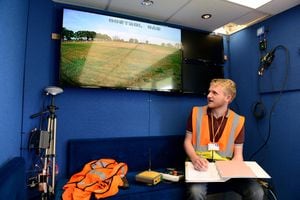
"Shropshire farmers are already using drones, precision equipment and making the most of other digital advances. They are learning all the time and monitoring changes in technology.
"With increasing costs of production, anything that improves on-farm efficiencies from time management, up-to-date records, to early disease indicators, are sure to be a huge asset to any business.
"Technology needs to be accessible and most importantly make business sense. While it will also never be a substitute for good stockmanship and farming experience it is an essential tool in the box for the modern farming business.
"With more reliance on computers and digital, comes an increased responsibility to get the right infrastructure in place to make best use of what is available."
Artificial Intelligence is very much a part of our everyday lives, from using a virtual personal assistant to organise our day, to having our phones suggest songs we might like.
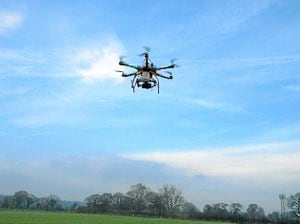
Beyond making our lives easier, smart systems help us solve some of the world’s biggest challenges: treating chronic diseases, fighting climate change and anticipating cyber-security threats.
In the UK alone, the market value of AI technologies are expected to increase at a compound annual growth rate of over 60 per cent by 2022 and add an additional £650 billion to the UK economy by 2035.
One company specialising in AI in agriculture is the Small Robot Company, which was founded in Shropshire.
Shropshire Star comment:
It harnesses the power and precision of robots and AI to improve the way that food is produced and minimise chemical usage.
It has developed robots which will accurately place seed individually in the ground at a uniform depth to within 2cm accuracy, creating a plant level map showing the location of each seed.
The technology is built on 15 years of robotics research by Professor Simon Blackmore, an expert on precision farming at Harper Adams University, near Newport, and field trials have been taking place on farms in Shropshire.
Co-founder of the company is Sam Watson Jones, a fourth generation farmer who farms at Howle Farm near Telford.
"Agriculture is arguably the last analogue industry – but within 10 years the digital farm will be here. This is the most exciting time it's ever been to be a farmer," he said.
"There's huge potential for farmers in embracing AI. It will completely transform what's possible on the farm. Ultimately, we will be able to employ permaculture techniques at scale – using gardening tactics such as companion planting, but for broadacre crops. Different crops could be planted alongside each other in the same field, and harvested at different times.
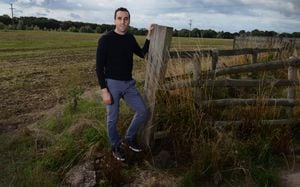
"With AI, we will be able to care for each plant individually, with no waste. The data unit will be the plant, rather than the field. This is more efficient, more precise and more productive. Both yields and profits will be higher, but at no cost to the environment. Even small farms will be profitable without subsidies.
"For the industry as a whole, this offers farming the chance to redress the balance with consumers. For too long, farmers have been demonised as the big polluters. With AI we have the chance to create an entirely new model for sustainable farming. The tractor is a blunt tool, but now, there is a real alternative, giving farming a closer and more harmonious relationship with both nature and consumers."
The use of autonomous machines in agriculture has already had its successes.
The Harper Adams University Hands Free Hectare project, run in collaboration with Precision Decisions, has seen a second crop harvested recently using a autonomous combine harvester and achieved unloading on the move for the first time with an ISEKI tractor.
The project returned in November of last year after receiving funding from the Agriculture and Horticulture Development Board to grow a crop of winter wheat, with the aim to improve the machinery’s accuracy and so improve field coverage, ultimately leading to a more competitive yield.

The first crop of spring barley was successfully harvested in September 2017.
According to Andy Haldane, chief economist at the Bank of England, the agricultural industry is gearing up for the "fourth industrial revolution", where machines will be replacing humans in "thinking" as well as "doing" roles.
Although Mr Haldane has predicted that up to 50 per cent of all jobs could be lost to new technologies, in the next four decades agri-tech will need considerable investment before it can address the labour shortage in agriculture, he said.

